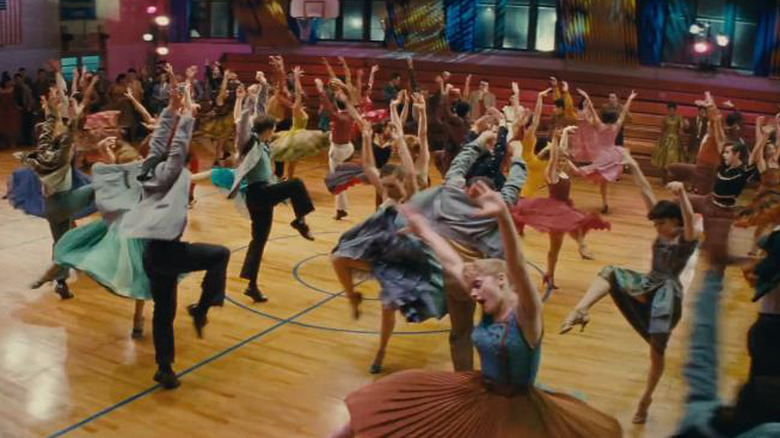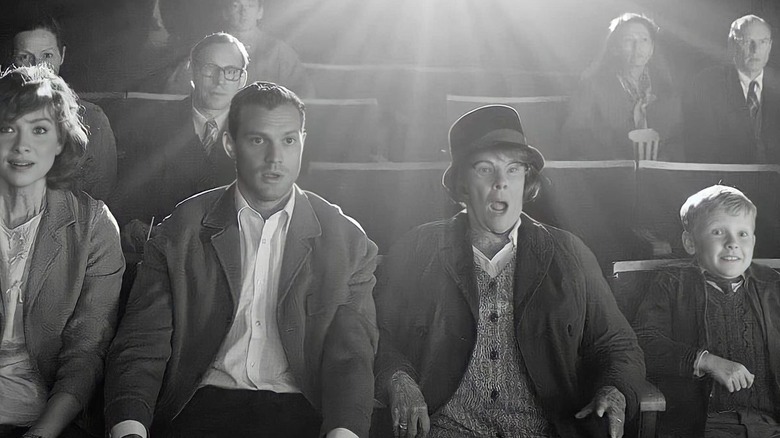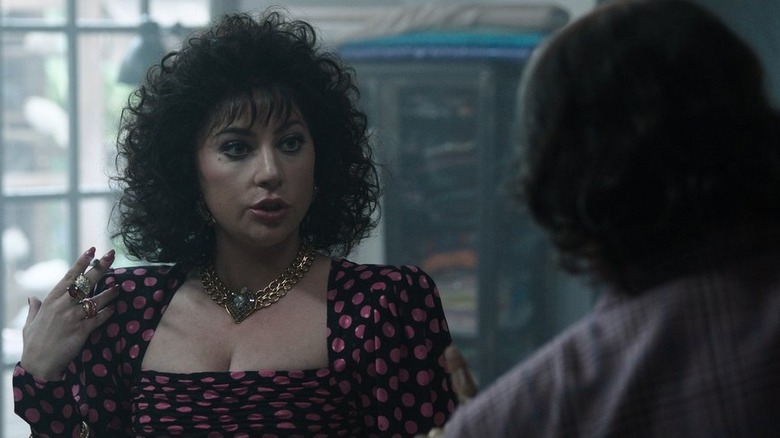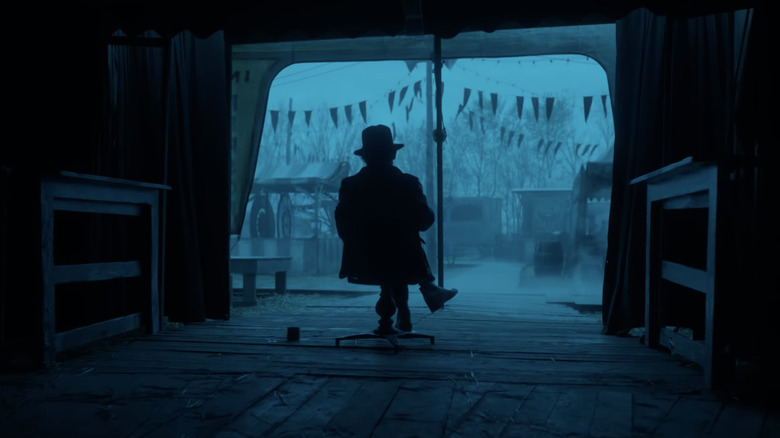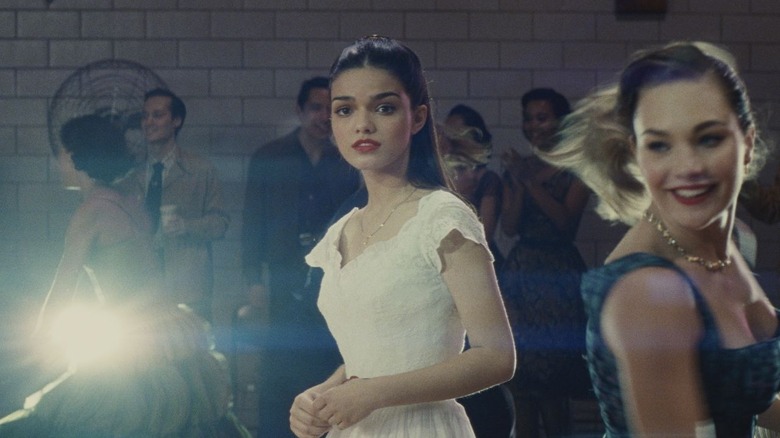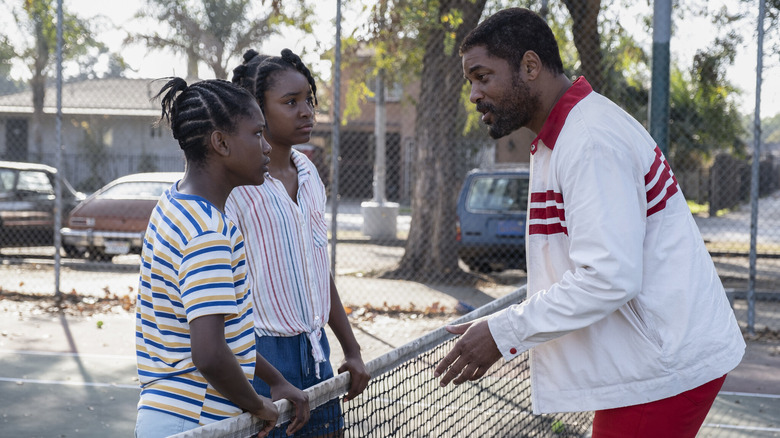The Real Reason Dramas Aren't Drawing Crowds At Movie Theaters Anymore
The 2021 theatrical box office was a rough experience for everyone, thanks to the ongoing effects of the COVID-19 pandemic on the moviegoing habits of people across the globe. However, certain types of films certainly fared better in drumming up a big box office in this difficult year than others. Horror movies and superhero fare, for example, continued to draw big crowds, almost as if the pandemic had never even happened. However, animated family movies have taken a while to find their stride.
Then there's the dramas, a medium that's housed countless big box office hits in the past ranging from "Titanic" to "Rain Man" to "Arrival." Already challenged in the years directly preceding this health crisis, the adult drama had an especially turbulent time on the big screen in 2021 thanks to projects like "The Last Duel" and "West Side Story" wiping out at the global box office.
This trend has inspired contemplation on why audiences aren't coming out to these types of features right now. It's even led some to wonder if there's even a future for dramas on the big screen. Unpacking those queries is a tricky endeavor that entails exploring why people aren't in the mood for seeing dramas theatrically right now while also delving into an assortment of reasons that could chalk up these financial shortcomings to problems with individual individuals movies rather than dramas as a whole.
Going through these factors can help pinpoint where dramas go next on the big screen. Here are the reasons that dramas have struggled to draw in viewers at theaters lately.
Older moviegoers aren't going to the movies yet
One thing that's apparent from nearly a year of releasing major theatrical features again in North America is that not everyone is going back to the movie theater. So far, the primary audiences that have come back to the multiplex are teenagers and younger adults. That's been perfect for features like the newest Marvel Cinematic Universe or "Fast and Furious" installments, which have always benefited from those age brackets. However, those have never been the core audience for adult dramas, even before the pandemic. You need older audiences to make those features a hit.
Unfortunately, older moviegoers, wary of getting exposed to COVID-19, have not been returning to movie theaters in droves, if at all, according to AP News. The lack of a sizeable audience of older moviegoers has doubtlessly hurt several key 2021 titles at the box office, including musicals such as "In the Heights," a genre that relies heavily on this demographic. Worse, titles that attract older audiences, such as "No Time to Die," aren't inspiring these moviegoers to check out other features, limiting a rising tide effect.
This demographic could still come back to movie theaters, but for now, the dearth of older moviegoers is hurting the ability of dramas to work on the big screen. It also must be said, in terms of theatrical attendance, that the ongoing effects of COVID-19, including the Omicron variant, are making everyone, old and young, choosy on what movies they see on the big screen.
Increased competition from streaming
There has always been competition in the movie theater business. In the earliest days of the medium, it seemed like the radio could distract people from leaving their homes and seeing movies. Next came television, which seemed like such a guaranteed killer for theatrical exhibitions that movie studios responded by incorporating features like CinemaScope into motion pictures to make them bigger must-see big-screen events. Then came video games, DVDs, and social media apps, as every generation seemed to bring a new form of entertainment that was declared the successor to theatrical moviegoing.
In the modern age, that competition comes from streaming, though this adversary is more powerful than prior entertainment formats, especially for adult dramas. For one thing, TV today is not the same as TV even ten years ago. Streamers provide limited-run shows and TV programs with the polished look and even stars of a typical mid-budget drama movie. For another, the pandemic has gotten people more accustomed than ever to the idea of just getting grounded dramatic entertainment at home through programs like "The Crown" or "The Underground Railroad."
Plus, streamers now deliver prestige features like "Don't Look Up" and "The Power of the Dog" at the touch of a button, a substantial increase from TV movies of the past. In the past, theatrical films felt different enough from video games and classic television to ensure these mediums could co-exist. Now, the biggest streaming projects do feel like they're moving directly onto the turf of big-screen dramas.
Previous film industry problems coming home to roost
In 2014, FlavorWire published a piece noting how studios, in the wake of the economic recession of 2008, had largely abandoned mid-budget movies. This left a hole in the marketplace where adult dramas rarely existed outside of award season. Even in that domain, though, they were shrinking in numbers. The final two months of 2014 reflected this by being dominated by new "Hunger Games," "Hobbit," and "Night at the Museum" installments, while original adult dramas were few and far between.
To give an idea of when this piece was penned, this was a whole year before Netflix began producing original movies and, in the process, upending the film industry. It was also long before the COVID-19 pandemic further impacted the cinematic landscape. Studios have been stingy about providing mid-budget dramas in the last decade, and that scarcity was significantly exacerbated in 2021, as studios sent dramas like "Finch" directly to streamers rather than dropping them in theaters. This caused there to be ever fewer major dramas than usual in the theatrical marketplace in 2021. With a minimal amount of titles released, there were fewer opportunities for this strain of filmmaking to prove its worth as a theatrical attraction.
The lack of mid-budget dramas produced for the big screen is not new. However, a problem that should've been solved ages ago took on ever greater shades of severity during the pandemic.
Diminished presence of award season
In the past, award season used to be a guaranteed way to drum up big business for adult dramas on the big screen. Titles like "Million Dollar Baby" or "American Sniper" would time their expansions into wide theatrical release to when Oscar nominations got announced, ensuring that moviegoers would have to see these projects to be up on the most acclaimed features of the year. However, in just a few years, award season has staggeringly diminished in importance. A key marketing tool for adult dramas has been eviscerated, damaging the box office potential for these projects in the process.
The problems facing the traditional award season are countless. For one thing, the Golden Globes, one of the biggest award ceremonies, has been plagued by controversy, and its 2022 edition wasn't even broadcast. Meanwhile, the Academy Awards draw fewer and fewer viewers every year, per CNBC, an indication that this ceremony is diminishing in the kind of influence it has in pop culture. It doesn't help that the pandemic has upended the schedule for when other award ceremonies, such as the Critic's Choice Awards, air, making it extra difficult for big-screen dramas to build off prestigious award season recognition to boost their box office. Award season used to be a boon to movies like "West Side Story." Now it's just an extra headache and a reminder of how much things have changed in the cinematic landscape in a short period of time.
The decline of the movie star
In the final weeks of 2019, The Huffington Post published an essay proclaiming that one of the great tragedies of the 2010s was how movie stars had vanished during this era of Hollywood filmmaking. The days of Tom Cruise or Kevin Costner's name above a poster being enough to draw in an audience no longer existed. For a confluence of reasons, the modern equivalent to this was brand names, as people sought out new Marvel or DC films rather than a new star vehicle from Adam Sandler or Julia Roberts. Actors were no longer making a box office hit.
This has been a difficult problem for adult dramas, which need big-name actors to help them stand out to moviegoers. With the likes of George Clooney or Angelina Jolie no longer being seen as viable draws, it gives marketers one less detail they can use to draw in audiences. The diminishing importance of movie stars was reaffirmed this year thanks to "The Last Duel," with its star-studded cast, becoming one of the year's biggest bombs while the presence of Kristen Stewart couldn't get "Spencer" to break out beyond core arthouse audiences. Even the presence of director Steven Spielberg behind the camera couldn't get moviegoers to line up for "West Side Story." Movie stars just aren't' the draw they used to be, and that adds one more challenge for the beleaguered adult drama to deal with.
COVID-19's impact on arthouse theaters
While movie theater chains like AMC and Cinemark managed to survive the pandemic, many independent theaters have been much more severely affected by this health crisis, as noted by Chicago Business. Ever since the pandemic began, news stories have broken regularly chronicling the struggles of these locations to keep the lights on thanks to difficulties in luring audiences to these locations. While arthouse theaters still exist, their numbers have dwindled, and that gives fewer options for where adult dramas, both in terms of mainstream studio fare and more challenging arthouse projects, can play.
It's especially difficult for arthouse titles. Projects like "Lady Bird" once built up word-of-mouth in these locations before expanding to general multiplexes. Now, it's even more difficult for new releases like "Titane" to have places where they can build up positive buzz before they can compete with the newest DC Extended Universe or MCU projects for screen space at your local Regal Cinemas. It also means projects like "West Side Story" have fewer places to play in, which might explain why the Steven Spielberg directorial effort never played in more than 3,000 theaters in its North American run. In these and other respects, the difficulties of arthouse theaters serve as another way adult dramas have found countless problems in working on the big screen in the pandemic era.
There haven't been a ton of dramas in the marketplace
The final months of 2021 saw the major American movie studios finally releasing an avalanche of movies meant to come out in 2020. These ranged from "Venom: Let There be Carnage" to "No Time to Die" to "Ghostbusters: Afterlife." This bombardment of massive titles, each requiring a theater count of over 4,000 locations, unleashed over 13 weeks didn't leave much room for other types of movies to drop into multiplexes. Save for a handful of arthouse titles, the only major dramas to directly open onto more than 1,500 screens in the last three months were "The Last Duel," "House of Gucci," "A Journal for Jordan," "West Side Story," and "Nightmare Alley."
For comparison's sake, the number of adult dramas that directly opened in over 1,600 locations in November 2019 was seven, more than the amount that hit theaters in the final three months of 2021. The minimal presence of dramas meant there weren't nearly as many opportunities for these types of films to reaffirm their value as big-screen draws as, say, horror movies. Of course, this doesn't automatically make the financial shortcomings of something like "The Last Duel" vanish. However, considering how few of these projects hit theaters at the end of 2021, it does seem like there isn't quite enough data to immediately declare their demise.
Too many grim dramas
Even before the pandemic, the adult dramas that attracted the most moviegoers in theaters were lighter fare that could work as entertainment. The biggest dramas of 2019 were not grim projects like "Clemency" but rather zippy crime thrillers like "Hustlers" or a project full of fast cars like "Ford v Ferrari." Even in 1996, the biggest drama of the year was "Jerry Maguire," which got a lot of mileage out of both Tom Cruise's star power and a light-hearted marketing campaign. No matter what genre you're occupying, the biggest Hollywood movies tend to be the ones that look like they'll be a good time.
The few dramas Hollywood offered up in 2021, meanwhile, didn't deliver the kind of upbeat wish-fulfillment scenarios people have often flocked to in big dramas. For instance, Clint Eastwood's "Cry Macho" was about taking responsibility to raise a kid, a far cry from the outlaw storyline that the box office hit "The Mule" offered in 2018. The entire narrative of "The Last Duel" was fixated on sexual assault, and even a big musical like "West Side Story" had trailers that didn't' shy away from emphasizing the inherently tragic nature of the central romance. Adult dramas don't need to offer up Spider-Man fighting Doc Ock to be successful, but they do need to channel past recent box office hits in the genre by offering some escapism if they want to be successful financially.
A string of bad release dates
Another problem that faced adult dramas in 2021 was simply that the studios in charge of these projects chose truly terrible release dates for these projects. "The Last Duel," for example, was released on October 15th in North America, one week after "No Time to Die" and the same day as "Halloween Kills." How could an original historical epic hope to compete with all these franchises? Finding a more hospitable home on the calendar could've immediately helped this one's box office chances rather than throwing it to get demolished by tentpole titles.
Meanwhile, "West Side Story" was dropped into theaters one week before "Spider-Man: No Way Home" in early December, a puzzling decision that ensured the critically acclaimed feature would have to compete with an avalanche of buzz surrounding the web-crawler's newest outing. It also ran against when musicals had been most successful in the past, with titles like "The Greatest Showman" and "Les Miserables" either debuting on Christmas Day or just five days before that holiday.
As for "Nightmare Alley," it had to open directly against "Spider-Man: No Way Home" and was sandwiched in between two other Disney titles, "West Side Story" and "The King's Man." Several elements contributed to the box office underperformance of these titles, but boneheaded release date decisions appear to be more of a factor here than audiences suddenly deciding they won't see any dramas on the big screen.
2021 dramas got undercut by simultaneous streaming releases
Of all the types of movies released in North American theaters in 2021, dramas were the ones most affected by simultaneous streaming drops. This practice began early in the year with best picture nominees like "Nomadland" and only continued as the year stretched on. Even while smaller-scale projects like "Copshop" or "Antlers" got to debut in theaters exclusively, high-profile new dramas like "Cry Macho" and "King Richard" had to compete with simultaneous HBO Max debuts.
The result of this rampant practice is that the majority of adult dramas in 2021 didn't get to inhabit traditional theatrical releases the way "Venom: Let There be Carnage" and "Free Guy" did. True, theatrical exclusivity didn't help "The Last Duel" or "West Side Story," but the latter did outgross all but one adult drama in 2021 (the exception being "House of Gucci.") The abnormally small grosses and sharp weekend-to-weekend declines for titles like "King Richard" indicates that adult dramas given simultaneous streaming debuts had even more problems to deal with than typical pandemic-era releases.
Strange release strategies kept arthouse titles from breaking out
The impact of the pandemic on arthouse theaters led to studios trying out a new release strategy for limited-release titles in 2021. In the past, the normal release pattern for such films has been to debut in 3 or 4 locations across New York City and Los Angeles before gradually expanding to more theaters across North America. In 2021, though, projects like "Titane," "Belfast," and "The Card Counter" all premiered right away in 500+ locations, as noted by Deadline, with some, like "Spencer," even going as far as to debut in 950+ locations. It was a maneuver meant to adapt to new theatrical release norms and get these acclaimed projects to the masses right away.
Unfortunately, going this route didn't work as intended. Even titles with fine opening weekends, like "Belfast," failed to show much week-to-week retention. In the process, a slew of arthouse projects got their entire domestic release bungled, in the process ensuring they could never become breakout adult drama hits that cross over into the mainstream. As late as 2017, productions like "Three Billboards Outside Ebbing, Missouri" would be more careful in how and when they expanded their theater count, in the process ensuring they could stick around for weeks and become box office smashes. Bringing 2021 titles like "The Eyes of Tammy Faye" into general release immediately just further deprived the year's box office from containing further hit dramas.
Most studios didn't even try releasing dramas in 2021
Another issue is that many studios didn't even try to release entries in this genre in the last three months of 2021. Sony and Universal opted to focus almost exclusively on franchise titles in this portion of the year. Meanwhile, Paramount Pictures only released "Clifford the Big Red Dog" in the final months of 2021. Even Lionsgate, which debuted dramas like "Midway" and "Bombshell" in the final two months of 2019, was barely heard from in the closing weeks of 2021, save for "American Underdog."
The absence of major dramas from these studios in 2021 does provide some explanation for the recent box office blues this genre suffered, especially since Universal and Sony/Columbia had a good track record with releasing these projects before the pandemic. Of course, recognizing that most studios didn't even attempt to launch adult dramas theatrically in 2021 doesn't automatically turn "The Last Duel" into a hit. However, it does show that there were fewer opportunities for this genre to prove itself in 2021. Perhaps Universal will have a better idea of how to launch these projects in the modern theatrical landscape. 2022, when all the major studios have sizeable dramas on their release schedules, will provide a clearer picture how whether or not these movies can still work as big-screen releases.

